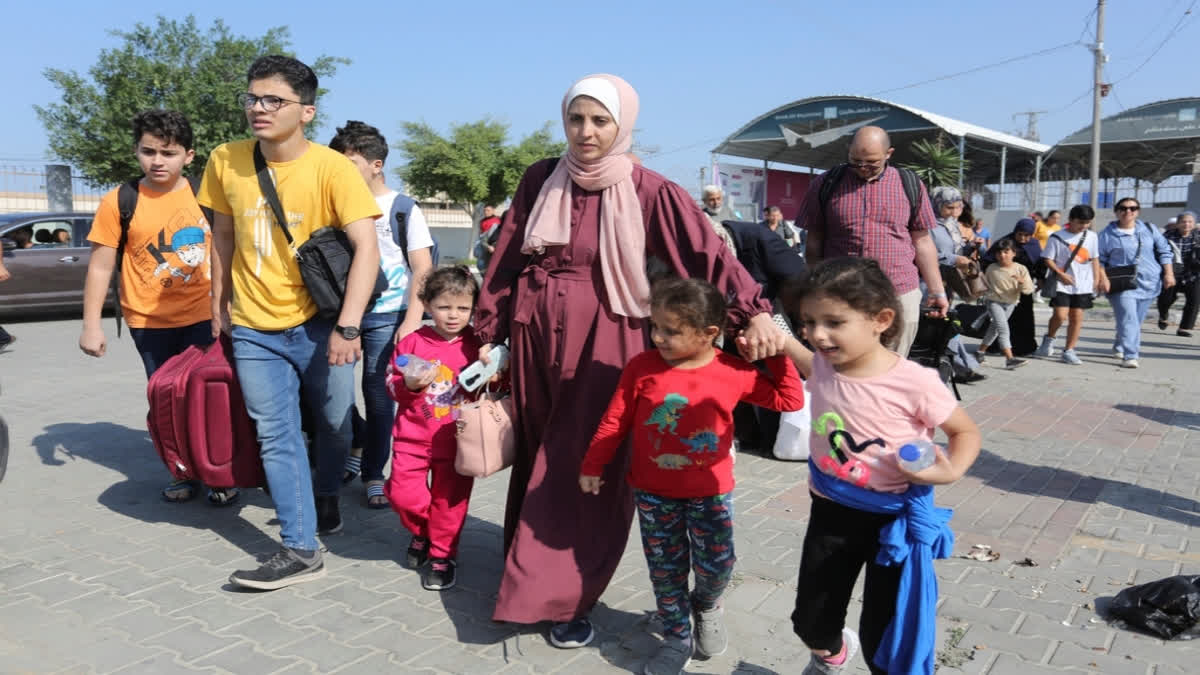Rafah (Egypt): Hundreds of dual passport holders and dozens of seriously injured Palestinians were allowed to leave Gaza on Wednesday after more than three weeks under siege, while Israeli airstrikes destroyed apartments in a densely populated area for the second straight day.
The group were the first people to leave Gaza -- other than four hostages released by Hamas and another rescued by Israeli forces -- even as bombings have driven hundreds of thousands from their homes, and food, water and fuel run low. It remained unclear whether more people would be allowed to leave Gaza in coming days.
Al-Jazeera television, one of the few media outlets still reporting from northern Gaza, aired footage of leveled apartments in the densely populated Jabaliya refugee camp near Gaza City, and of several wounded people, including children, being brought to a nearby hospital. The Hamas-run government said airstrikes killed and wounded many people, but the exact toll was not yet known.
The Al-Jazeera footage showed nearly identical scenes as the day before; dozens of men dug through the gray rubble of demolished multistory buildings in search of survivors.
The toll from Tuesday's strikes was also unknown, though the director of a nearby hospital said hundreds were killed or wounded. Israel said those strikes killed dozens of militants, including a senior Hamas commander who was involved in the militants' bloody Oct. 7 rampage that ignited the war, and destroyed militant tunnels beneath the buildings.
In a sign of increasing alarm over the war among Arab countries, Jordan on Wednesday recalled its ambassador from Israel and told Israel's ambassador to remain out of the country. Jordan, a key U.S. ally, signed a peace deal with Israel in 1994, the second Arab country after Egypt to do so.
Jordan’s Deputy Prime Minister, Ayman al-Safadi, said the return of the ambassadors is linked to Israel “stopping its war on Gaza … and the humanitarian catastrophe it is causing.” He warned of the potential of the conflict to spread, threatening “the security of the entire region.”
DEATH TOLL KEEPS RISING
More than 8,700 Palestinians have been killed in the war, mostly women and minors, and more than 22,000 people have been wounded, the Palestinian Health Ministry said Wednesday, without providing a breakdown between civilians and fighters. The figure is without precedent in decades of Israeli-Palestinian violence.
Over 1,400 people have died on the Israeli side, mainly civilians killed during Hamas’ initial attack, also an unprecedented figure. Palestinian militants also abducted around 240 people during their incursion and have continued firing rockets into Israel. Fifteen Israeli soldiers have been killed in Gaza since the start of the ground operation.
Israel has been vague about its operations in Gaza, but residents and spokesmen for militant groups say troops appear to be trying to take control of the two main north-south roads. An estimated 800,000 Palestinians have fled south from Gaza City and other northern areas following Israeli orders to evacuate, but hundreds of thousands remain in the north.
Israel has allowed international aid groups to send more than 200 trucks carrying food and medicine to enter from Egypt over the past 10 days, but aid workers say it's not nearly enough.
ISRAELI ARMY ADVANCES DEEPER INTO GAZA
Israeli ground forces pushed to the outskirts of Gaza City, days after launching a new phase of the war that Israel's leaders say will be long and difficult. Internet and phone service was cut for several hours Wednesday, a replay of the temporary communications blackout when Israeli ground troops first advanced in large numbers into Gaza over the weekend.
Over half of Gaza's 2.3 million people have fled their homes, and supplies of food, medicine, water and fuel are running low. A territory-wide blackout has left hospitals reliant on generators that could soon be forced to shut down.
The strikes in Jabaliya underline the anticipated surge in casualties on both sides as Israeli troops advance toward the outskirts of Gaza City and its dense residential neighborhoods. Israeli officials say Hamas’ military infrastructure, including hundreds of kilometers (miles) of underground tunnels, is concentrated in the city, which was home to some 650,000 people before the war.
